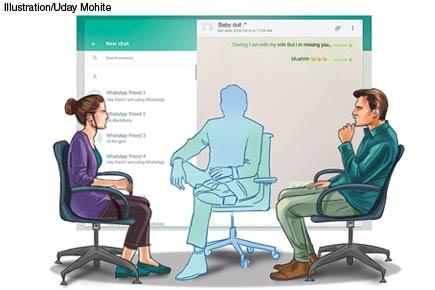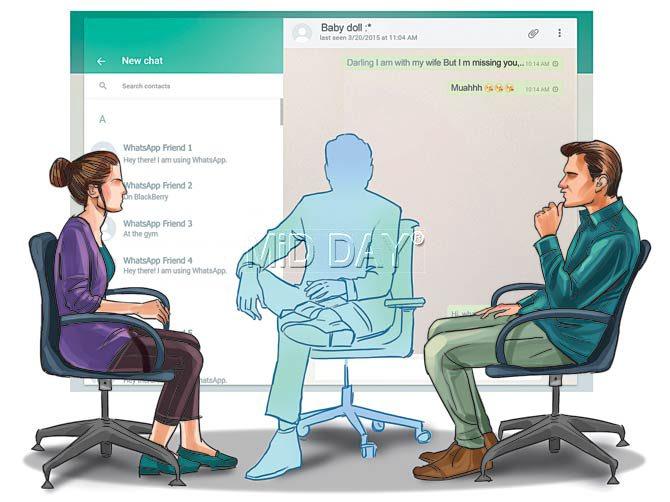Easy Internet access is becoming the no 1 cause of marital splits in Maharashtra. Family court lawyers across the state share stories of broken offline connections and suggest a digital detox

 The TedxBend video Do our devices divide us?, of American photographer Eric Picksergill, went viral when it was uploaded in May this year. Earlier, in 2011, Alone Together: Why We Expect More from Technology and Less from Each Other, moaned that smartphones were diminishing people’s capacity for empathy. Surveys conducted by various groups accounting for the 200 million smartphone users in India cautioned against the loss of face-to-face conversations in a handset-glued climate. The warning bells don’t seem to be awakening many, if the marital discord cases hinging on the relentless use of mobile phones, currently pending settlement in 25 family courts across the state, are any indication. The desperation for virtual-over-real connections is apparent.
The TedxBend video Do our devices divide us?, of American photographer Eric Picksergill, went viral when it was uploaded in May this year. Earlier, in 2011, Alone Together: Why We Expect More from Technology and Less from Each Other, moaned that smartphones were diminishing people’s capacity for empathy. Surveys conducted by various groups accounting for the 200 million smartphone users in India cautioned against the loss of face-to-face conversations in a handset-glued climate. The warning bells don’t seem to be awakening many, if the marital discord cases hinging on the relentless use of mobile phones, currently pending settlement in 25 family courts across the state, are any indication. The desperation for virtual-over-real connections is apparent.

Illustration/Uday Mohite
A Bengaluru-based husband’s failure to provide Wi-Fi facility to his 25-year-old computer engineer-wife, resulted in a divorce petition in the family court in Pune - the city where the duo had romanced and married a year ago. The husband said he could not afford an unlimited wireless network at a time when he had just changed jobs and cities; the wife claimed deprivation of a key survival tool for job searches in a new city. Both have been counselled into staying together for a period in order to assess if their marriage can be steered away from the hot spot. They have also been asked to zero in on some low-cost Internet access which may ensure marital bliss.
Smita Joshi, the Pune counsellor who awaits the couple’s decision, says the dispute is among the most remembered matrimonial conflicts in her 20 years of service. While spousal discord resting on smartphones, social media apps and other virtual media platforms has been her everyday fare for the last five years, and has been on the rise, the surprise element was a litigating wife, unapologetically terming Wi-Fi as a “necessity” in the line of food, clothing and shelter. “While we were trying to persuade the couple about the worthlessness of technology over something as solid as marriage, she told us how suicidal it was for her to remain “unconnected” in a job market. From a purely women’s empowerment perspective, her petition had made a valid point that talks of the changing dynamic. Joshi said the petition could not be treated moralistically but holistically. “We want to save the marriage but not without acknowledging all sides of the story.”
Senior Counsel practising in the seven family courts in Mumbai, Sajan Oommen (past president of Family Court Bar Association) has studied such cases in greater detail because the Maximum City offers four-fold scope for surreptitious use of smartphones, near-24x7 chatting on social media trappings like Facebook or applications like Whatsapp. He states that nearly 90 per cent of the matrimonial cases pending settlement in the seven courts in Mumbai revolve around FB and WhatsApp exposés. The physical copies of the screen shots of online chats constitute a huge base of the annexed documents in several divorce or child custody petitions.
Oommen cited an ongoing dispute between a middle aged couple, in which the wife has filed a petition for protection of her rights over the matrimonial home. “When we placed the 250 printed pages of chat messages, which pertained to exchanges over only two nights, the judge was bewildered by the volume. More so, because adolescent children of the couple had taken the screen shots of the chat to prove the extensive time their father was giving to sexually explicit chats with another woman,” he says.
Oommen says smartphone-related cases have prompted him to take orientation lectures on mobile etiquette and family togetherness. “Being an advocate for 26 years, and having gone through a bagful of disputes centering on mobile phone usage, I have started engaging the newly-marrieds and general public on the need for ‘digital detox’.” His sessions — 20 have been conducted in the last four years — address issues like ‘Virtual Time versus Family Time’, ‘Do you need to be online and available?’ ‘Is your cell phone part of your family dinner?’ ‘Do you carry your phones to the washroom?’ ‘Is your pregnancy an FB status?’
Un-savviness in handling technology has often landed couples in the soup, with vital evidence of their misdeeds going into the wrong hands. For instance, a wrong text message sent by a Dadar-based navy captain to his wife (meant for his girl friend) wrecked the relationship and ended in a child custody petition; a picture ‘Whatsapped’ mistakenly to the wife became key evidence of “revived extramarital ties” in a domestic violence case; a wife’s Facebook party pictures (publicly shared without privacy restrictions) became the basis of an adultery case filed by her Dubai-based husband who had a minute-to-minute tracking of her goings-on in Mumbai; in another case the wife produced the husband’s dance bar photo stream to prove his unsuitability as a guardian of minor children.
Sujata Kulkarni, retired counsellor (Thane Family Court), echoes similar objections to misleading Facebook statuses. She recalls a 30-year-old husband who appeared twice (2014) in the court on the same day - once for a divorce petition filed by his wife and then in a plea seeking annulment of marriage by his school mate whom he had tricked into wedlock by claiming to be single on FB. “At a time when he was in a deep conflict with his wife, he had the gumption to create a false FB account and reunite with his SSC batchmate. Also, isn’t it surprising that no one in the group (virtual class reunion) knew about his marital history? The girl took him at ‘face value’ without once meeting his parents.”
Lawyer-turned-mediator (adju-dged the Best Mediator by the Bombay High Court’s Mediation Committee) in the Nagpur Family Court, mediator Sharmila Charalwar, (resolved 192 disputes out of 223 in 2015, using role play as one of the arbitration techniques), feels the mobile phone-centric discord has specific shades in the orange city. “Men resent the new-found ‘smartphone freedom’ enjoyed by women. Women talking or chatting extensively raise suspicion, especially amongst the newly married. Most disputes that I am currently mediating involve young couples in which the wife seeks equal access to friends’ groups and chat hubs. She makes it into a rights issue whereas the husband makes it into a conjugal negligence case.” Charalwar is currently a part of the felicitation of 101 couples, reunited by Family Court in Nagpur, which aims at encouraging a sharing of coping strategies and best practices. CM Devendra Fadnavis and Guardian Judge of Family Courts, Justice Revati Mohite-Dere will be present for this Nanda Saukhya Bhare (Live Happily) event on August 7.
A recent case handled by a Nanded-based marriage counsellor Dhanashree Deo showed how mobile phones are playing spoilsports in second and third tier cities, as seen in some State Women's Commission hearings. A marriage counsellor in Pune asked a husband to cite reasons why he hadn’t connected with his spouse for six months after a dispute over unpaid dues rocked the marriage. Denying the charge of abandonment, the man said he was in regular touch with his wife. To prove his point, he flashed a cake, flowers, shawl and birthday greetings Whatsapped to his wife at repeated intervals. Virtual reality that was!
 Subscribe today by clicking the link and stay updated with the latest news!" Click here!
Subscribe today by clicking the link and stay updated with the latest news!" Click here!









